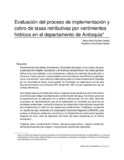| dc.creator | González Ceballos, Mónica María | spa |
| dc.creator | Bedoya Agudelo, Rogelio de Jesús | spa |
| dc.date.accessioned | 2016-01-29T23:02:39Z | |
| dc.date.available | 2016-01-29T23:02:39Z | |
| dc.date.created | 2003-06-30 | |
| dc.identifier.issn | 0120-6346 | |
| dc.identifier.uri | http://revistas.udem.edu.co/index.php/economico/article/view/1375 | |
| dc.identifier.uri | http://hdl.handle.net/11407/1925 | |
| dc.description | Diariamente las actividades domésticas e industriales descargan, a los cuerpos de agua, sustancias de múltiples naturalezas y de diversas características, las cuales generan daños a las comunidades, a los ecosistemas y alteran los sistemas de producción y consumo. Como solución a este problema, los instrumentos económicos se plantean como una solución costo-efectiva viable para producir la descontaminación deseada por la comunidad al menor costo posible. En Colombia, se replantea el uso de este tipo de instrumento con el Decreto 901 de abril de 1997, el cual, reglamenta el uso de la Tasa Retributiva.Este trabajo expone el fundamento teórico y legal de la tasa retributiva como instrumento económico para mitigar el problema de la contaminación del agua. Así mismo, presenta la experiencia de su aplicación en el ámbito internacional. De otro lado, describe el proceso de implementación que se ha adelantado en Colombia por parte de las entidades ambientales, haciendo énfasis en los desarrollos institucionales requeridos para implementar el cobro en las respectivas jurisdicciones. Finalmente, se plantea un estudio de caso, tomando a la Corporación Autónoma Regional CORNARE, para evaluar la eficiencia ambiental, económica y el fortalecimiento institucional logrados después de cinco años de aplicación del cobro de tasas retributivas en el oriente antioqueño. | spa |
| dc.description.abstract | Daily, domestic and industrial activities unload, into the bodies of water, substances of múltiple natures and diverse characteristics which produce harm to communities, to the ecosystems and alter production and consumption systems. As a solution to this problem, the economical instruments are expounded as a viable cost-effective solution to produce the decontamination longed for by the community at the least cost possible. In Colombian, the use of this kind of instruments is restated with Decree 901 of April, 1997, which regulates the use of the Retributive Rate.This paper exposes the theoretical and legal foundation of the retributive rate as an economical interest to mitígate the problem of water contamination. Furthermore, it presents the experience of its application on an international level. On the other hand, it describes the process of implementation that has been put forwards in Colombia by the environmental entities, making an emphasis on the institutional developments required for the implementing of payment charges in the respective jurisdictions. Finally, a case study is expounded, taking the Regional Autonomous Corporation, CORNARE, in order to evalúate the environmental and the economical efficiency and the institutional strengthening accomplished after five years of applying the charge of Retributive Rates in the Oriente Antioqueño. | eng |
| dc.format.extent | p.125-150 | spa |
| dc.format.medium | Electrónico | spa |
| dc.format.mimetype | application/pdf | |
| dc.format.mimetype | text/html | |
| dc.format.mimetype | PDF | |
| dc.language.iso | spa | |
| dc.publisher | Universidad de Medellín | spa |
| dc.relation | http://revistas.udem.edu.co/index.php/economico/article/view/1375/1431 | spa |
| dc.relation | http://revistas.udem.edu.co/index.php/economico/article/view/1375/1412 | spa |
| dc.relation.ispartofseries | Semestre Económico; Vol. 6, núm. 11 (2003) | spa |
| dc.relation.haspart | Semestre Económico; Vol. 6, núm. 11 - enero/junio 2003 | spa |
| dc.rights.uri | http://creativecommons.org/licenses/by-nc-sa/4.0/ | * |
| dc.source | Semestre Económico; Vol. 6, núm. 11 (2003) | spa |
| dc.source | 2248-4345 | spa |
| dc.source | 0120-6346 | spa |
| dc.subject | Hydric contamination | spa |
| dc.subject | Pigouvian taxes | spa |
| dc.subject | Environmental impact | spa |
| dc.subject | Biochemical demand of oxygen | spa |
| dc.subject | Regional Autonomous Corporations | spa |
| dc.subject | Contaminación hídrica | spa |
| dc.subject | impuestos pigouvianos | spa |
| dc.subject | impacto ambiental | spa |
| dc.subject | demanda bioquímica de oxígeno | spa |
| dc.subject | corporaciones autónomas regionales | spa |
| dc.title | Evaluación del proceso de implementación y cobro de tasas retributivas por vertimientos hídricos en el departamento de Antioquia | spa |
| dc.relation.citationvolume | 6 | |
| dc.relation.citationissue | 11 | |
| dc.relation.citationstartpage | 125 | |
| dc.relation.citationendpage | 150 | |
| dc.audience | Comunidad Universidad de Medellín | spa |
| dc.publisher.faculty | Facultad de Ciencias Económicas y Administrativas | spa |
| dc.coverage | Lat: 06 15 00 N degrees minutes Lat: 6.2500 decimal degreesLong: 075 36 00 W degrees minutes Long: -75.6000 decimal degrees | spa |
| dc.publisher.place | Medellín | spa |
| dc.relation.ispartofes | Semestre Económico | spa |
| dc.identifier.eissn | 2248-4345 | |
| dc.type.version | info:eu-repo/semantics/publishedVersion | |
| dc.type.driver | info:eu-repo/semantics/article | |



